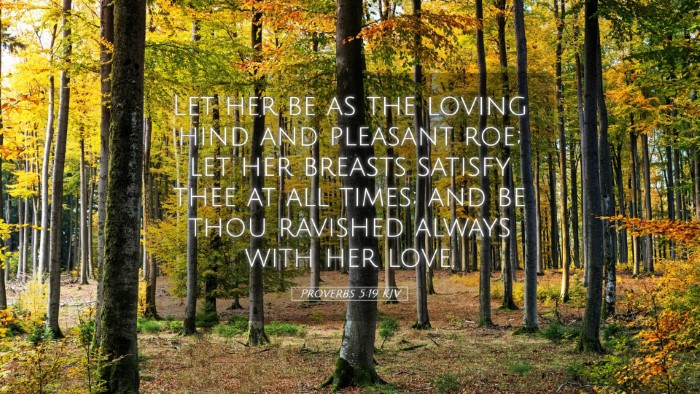Commentary on Proverbs 5:19
Proverbs 5:19 presents a striking metaphor that emphasizes the joy and satisfaction found within the bonds of marriage. This verse is often cited and explored in the context of fidelity, love, and the sanctity of the marital relationship.
Text of Proverbs 5:19
"As a loving hind and a pleasant doe; let her breasts satisfy thee at all times; and be thou ravished always with her love."
Contextual Background
The context of this verse comes from a chapter dedicated to the warnings against sexual immorality and the exhortations to cherish the marriage relationship. Proverbs is a collection of wisdom literature, advising the reader on how to live righteously and avoid the pitfalls of folly and sin.
Insights from Public Domain Commentaries
Matthew Henry's Commentary
Matthew Henry highlights that the "loving hind" and "pleasant doe" symbolize the beauty and tenderness of a wife. He notes that the imagery evokes feelings of gentleness and affection, suggesting that the marital relationship should be characterized by warmth and delight.
Henry stresses the importance of marital intimacy, asserting that it should not be neglected. His commentary underscores that physical intimacy is a natural and God-ordained aspect of marriage that contributes to a deep emotional connection.
Furthermore, Henry points out the phrase "be thou ravished always with her love" as a call to continuous passion and attraction, indicating that love and desire within marriage should be a consistent and joyful experience.
Albert Barnes' Notes on the Bible
Albert Barnes provides a detailed examination of the metaphorical language employed in Proverbs 5:19. He elucidates that the "hind" and "doe" refer to creatures known for their gracefulness, indicating that a husband should find his wife equally graceful and beloved. Barnes emphasizes that such imagery reflects the ideal of delighting in one’s spouse.
He stresses the necessity of maintaining a loving and joyous relationship as a counter to the temptations that may lead to infidelity. Barnes' perspective includes a focus on both emotional and physical components of love, drawing attention to the balance that should exist in the marriage relationship.
Adam Clarke's Commentary
Adam Clarke brings forth an explication of the original Hebrew terms used in this verse. He notes that the words for "loving" (חָנָן) and "pleasant" (נָעָמָה) imply favor and beauty. Clarke’s interpretation suggests that this passage commands a husband to appreciate the intrinsic worth and beauty of his wife.
Moreover, Clarke highlights the instructive aspect of the proverb, warning against searching for satisfaction outside the marriage. His analysis emphasizes the divine intention behind marital love, ensuring that it remains a source of true joy and fulfillment.
Theological Implications
Proverbs 5:19 encapsulates significant theological themes regarding marriage. At its core, the verse underscores the belief that marriage is a covenantal union ordained by God, where love flourishes and intimacy is encouraged.
From the insights of these commentators, we learn that fidelity and delight within marriage are not merely advised but are essential for a healthy spiritual life. The verse also reflects God’s desire for humans to experience contentment and joy in the most intimate of relationships.
Practical Applications
For pastors, students, and theologians, Proverbs 5:19 serves as a rich source for sermon preparation, teaching, and personal reflection. Here are some practical applications:
- Promoting Marital Fidelity: Emphasize the importance of remaining faithful to one’s spouse both physically and emotionally.
- Cultivating Intimacy: Encourage couples to continuously seek ways to grow in affection and passion throughout their marriage.
- Teaching on God’s Plan for Love: Use this verse to discuss the beauty and sanctity of marital love as designed by God.
Conclusion
In conclusion, Proverbs 5:19 offers profound insights about the joy found within the marital relationship. The commentaries of Henry, Barnes, and Clarke enrich the understanding of this verse, allowing pastors, students, and theologians to glean wisdom applicable to their teaching and personal lives. Embracing the principles of delight and satisfaction within marriage not only fulfills God’s design but also nurtures thriving familial and community life.


